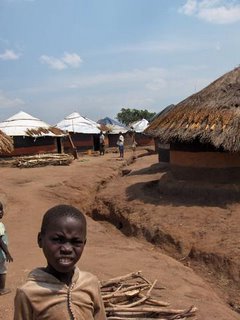 M: With much distress, I boarded the same small Eagle Air LET-410 on Wednesday the 7th of December and made the twenty-minute flight to Gulu (a district southwest of Kitgum).
M: With much distress, I boarded the same small Eagle Air LET-410 on Wednesday the 7th of December and made the twenty-minute flight to Gulu (a district southwest of Kitgum).Gulu Town has the second largest population in Uganda, with Kampala being the largest. UNOCHA sent a driver to fetch me from the airport (landing strip), bring me to the Hotel Pearl Afrique to check-in, and then bring me to the UNOCHA/UNICEF office to meet with some of their staff. The next day (after much confusion), a UNICEF driver took me to Pabbo IDP camp.
Pabbo Camp is about forty kilometres from Gulu Town and is perhaps one of the largest IDP camps in northern Uganda, with approximately 63,000 people. Gulu district is much safer than other districts in northern Uganda and is well protected by the UPDF. So, although I went to Pabbo camp in an APV, we did not need military escorts because the road was safe. The main road going from Gulu Town to Kampala is also safe for anyone to travel on (relatively speaking). The government has even gone so far as allowing IDPs to return to their villages between 9am and 4pm so that they can work their land. This is a welcome relief for a population that was forced to move to these camps, which were hastily built in a very haphazard (totally chaotic and disorganised) fashion during one of the LRA’s insurgencies in the 1990s.
The Acholi, who are originally agriculturalists, have no space or land in these IDP camps in which to grow crops and live sustainably (although some have created small plots on the outskirts of the camps but this sometimes results in being abducted from the fields or LRA stealing the crops or cattle during the night). This has resulted in a lack of livelihood for over a million people and the men in the camps have turned to alcohol and sexual violence. During the drive to the camp, we passed large trucks carrying food aid from the UN World Food Program (WFP). This convoy of food aid trucks was very HEAVILY protected with serious machinery. Upon arrival, a camp leader took me around parts of the camp. Again, I played the role of the pied piper! This camp, despite its massive population and the fact that there was a cholera outbreak not too long ago in which several deaths occurred, seems to be much better off than others due to its secure status and the import and export of goods from cultivated fields and Kampala.
Friday morning (9 December 2005) I spent sitting in on one of UNICEF’s workshops/training to UPDF officers (males and females) on sexual gender based violence (SGBV). It was interesting to hear some of the comments from the males who believe that if their wife does something wrong or is late with dinner, it is all right to discipline her by beating her…or that a husband had the right to force sex on his wife (because she actually does want it but wants to play ‘hard to get’). I could go on, but I don’t want to give the wrong impression and paint a bad picture of Ugandan culture.
Generally, Ugandans are good people, they are resilient and forgiving and pleasant and helpful but I cannot deny that they hold some cultural beliefs of gender roles that infringe upon basic human rights. I then had to get back on that same (and dreaded) small communist-era airplane and head back to Entebbe/ Kampala.
To see more photos of Gulu, click on the photo above and you will be automatically directed to the album. Post a comment and let us know what you think!
To see more photos of Gulu, click on the photo above and you will be automatically directed to the album. Post a comment and let us know what you think!


No comments:
Post a Comment